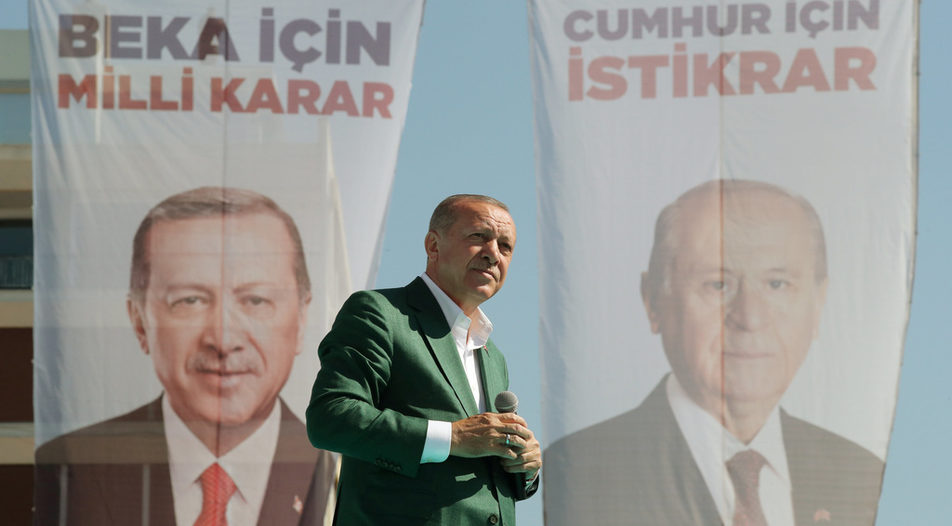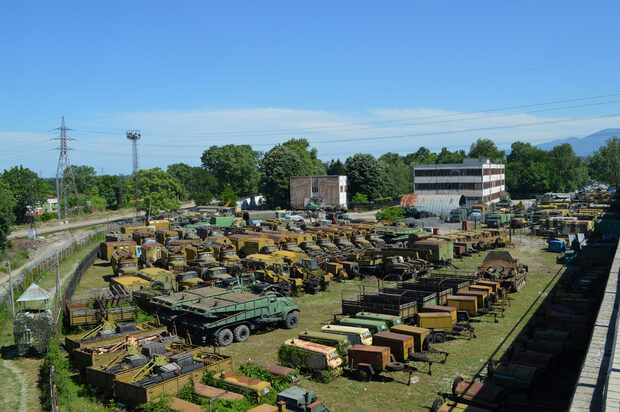The crisis in Turkey was a disaster waiting to happen. And the most striking thing about it is that as the economy is speeding towards collapse, the president, Recep Tayyip Erdogan, has refused to take his foot off the accelerator.
It seems obvious what Ankara has to do to avoid the catastrophe - devise a credible plan to stabilize the overheating economy, unleash the reins on the central bank and resolve the spat with the USA that triggered the crisis. Instead, Erdogan is summoning Allah, urging Turks to stop buying iPhones and keeps threatening that Turkey will find new markets and new allies. As a result the lira keeps plunging (it has depreciated more than 40% against the US dollar so far this year), inflation has surged to its highest level in nearly 15 years and the currency crisis is sinking the economy. Leaving aside the looming economic meltdown, the most important question is whether this is a turning point in Turkey's relations with the USA - and the West more generally - or just another bump in the road.
Though the volatile leaders in both Ankara and Washington make it hard to predict how the situation will develop, it is more likely that in several months' time there will be a thaw and then some normalisation. One of the positive effects of the fight with the USA is that it is urging Ankara to mend its ties with Europe. That could only benefit Bulgaria, for which it is much better to have its big unruly neighbour as closely engaged with the EU as possible. Bulgaria has tried to play a balancing role between Turkey and the EU, but Sofia generally has the role of the mouse trapped inside a fight between elephants.
When Tayyip clashes with Trump
Erdogan has proved many times willing and able to back down in diplomatic fights when the circumstances required it. And the expectation is that the economic necessity would once again push his pragmatism to the fore. But so far his row with Donald Trump is an exception. "This fight with the USA is different than the crisis Turkey had with Russia and Germany. And the story with pastor Andrew Brunson is just a drop in an already full glass. America and Turkey have numerous and serious problems between them," says Behlul Ozkan, associate professor at Marmara University.
What complicates the situation even more are the similarities between Erdogan and Trump - both are strongman leaders, easily offended and with taste for risky bets. What is more, for both of them the case of pastor Brunson is highly charged politically. For Trump at stake is rallying the evangelical votes before the November midterm elections. For Erdogan is important to show to his base that Turkey will not be bullied.
With investors jittery and the need Turkey to attract more than $200bn a year in foreign financing to keep its economy afloat, Erdogan will have no choice but to give in eventually and cede to Trump's demand to release Brunson. And the further the Turkish president escalates the fight, the harder it will be for him to back off. "The problem is President Trump has not given an honourable way out of the crisis. If Turkey backs down unilaterally, President Erdogan will appear weak which he cannot stand," says Ozgur Unluhisarcikli, Ankara office director at the German Marshall Fund of the United States. After being pushed into a corner, Erdogan has to be offered something in return, so that it looks like a compromise rather than his defeat.
The same applies to the measures needed for avoiding the economic crash. They also present Erdogan with hard dilemma, because if he doesn't allow interest rates to be raised or turn to the IMF for rescue as the last option, Turkey is threatened by financial chaos, liquidity crisis and deep recession. But for Erdogan it would be hard to swallow giving in under the pressure of the markets or accepting the IMF conditions. "He will change his economic approach when the political cost of the economic crisis is bigger than the political cost of necessary reforms," says Ozgur Unluhisarcikli.
Best frenemies
Erdogan has been playing geopolitical poker for years. His bluffs that he will turn to Russia or China, will stop the defence cooperation with the USA and NATO or will flood Europe with refugees have usually helped him get what he wants. The question now is whether now he has gone too far or the damage could still be managed.
"The relationship between Turkey and America is certainly not broken beyond repair, but the situation is really very concerning. These developments could potentially trigger a dynamic which could lead to Turkey's departure from the West over the course of time," says Ozgur Unluhisarcikli. But that will be an incident rather than a strategy.
Erdogan may be looking for alternative allies, but China, Qatar or Russia lack financial firepower or will to bail out Ankara. Russia has got its own problems with US sanctions and would put pressure on Turkey in Syria rather than make presents to Erdogan. China's priority is stopping the trade war Trump has launched against it and would be wary of upsetting him. So far only Qatar has offered concrete support with the promise of a $15bn investment package. But Qatar would not be able to provide enough support on its own.
"There is no realistic alternative to the US and the EU for Turkey from either the security or economic perspective," points out Ozgur Unluhisarcikli. Erdogan's claims of geopolitical reorientation are mostly aimed at the domestic public. "He knows very well that Turkey needs the West. But he wants to proclaim that the West also needs Turkey," says Behlul Ozkan. Hopefully, the Turkish president will not let the economy sink just to prove his point.
The crisis in Turkey was a disaster waiting to happen. And the most striking thing about it is that as the economy is speeding towards collapse, the president, Recep Tayyip Erdogan, has refused to take his foot off the accelerator.
It seems obvious what Ankara has to do to avoid the catastrophe - devise a credible plan to stabilize the overheating economy, unleash the reins on the central bank and resolve the spat with the USA that triggered the crisis. Instead, Erdogan is summoning Allah, urging Turks to stop buying iPhones and keeps threatening that Turkey will find new markets and new allies. As a result the lira keeps plunging (it has depreciated more than 40% against the US dollar so far this year), inflation has surged to its highest level in nearly 15 years and the currency crisis is sinking the economy. Leaving aside the looming economic meltdown, the most important question is whether this is a turning point in Turkey's relations with the USA - and the West more generally - or just another bump in the road.












